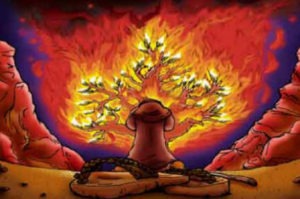 This homily was delivered on 17 July 2013 based on the readings for the day (Exodus 3:1-6, 9-12 and Matthew 11:25-27)
This homily was delivered on 17 July 2013 based on the readings for the day (Exodus 3:1-6, 9-12 and Matthew 11:25-27)
I think I had my first religious experience at the age of ten, and it came courtesy of Moses–or more precisely, Charlton Heston in the Cecil de Mille movie “The Ten Commandments.” I still remember the film’s most dramatic scene: Moses, towering over the Israelites, faces the Red Sea, spreads his arms before it, and as the most rousing soundtrack blares, the sky rushes into the waters and before you know it, the waters part, forming a wall on each side and a virtual highway for the fleeing Israelites. Remember this was before the era of Computer Generated Images.
Of course years later, a theology professor at my university burst my bubble by telling our class that the Red Sea never parted; in fact, he said with, I suspect, some relish, it was just a swamp that happened to dry up.
Today’s First Reading features the burning bush experience of Moses, where in a sense it all began, where his unexpected transformation from shepherd to prophet transpires. What struck me today was the question he asks Yahweh: “Who am I that I should go to Pharoah, and bring the Israelites out of Egypt?”
It’s a bewildering question when you think about it. How can this towering, larger-than-life prophet feel any such hesitation or apprehension? Isn’t it a little bit out-of-character?
The answer seems to be “No.” Moses’ hesitation about his mission is actually typical of prophets and disciples that God has called. Think of the young Jeremiah who, upon hearing God’s call, protested that he was too young. Let’s not forget Jonah who, upon being sent to Nineveh, fled exactly the opposite direction. In the New Testament, we have Simon Peter at the Miraculous Catch protesting to the Lord, “Leave me, for I am a sinful man!” Of course there is Mary at the Annunciation, who took some time thinking about the angel’s words before accepting the invitation to be the Mother of God.
Many of us probably experienced a similar reluctance or hesitation when we first heard our own call. Some of us probably did a little Jonah, but by now we all know what God is capable of doing to get our attention, sending large marine mammals not excluded!
But what makes Moses’ question even more striking is that it wasn’t just typical of would-be prophets and disciples. Contrary to what we may think, it wasn’t at all out-of-character for Moses. The truth of the matter is that he was actually very much in character. A couple of weeks ago, I read a fascinating book about introverts, appropriately called Quiet; and in it, the author, Susan Cain, names Moses as an example of an introverted biblical character. And she’s right. Unlike Charlton Heston’s version, the biblical Moses was no eloquent orator. The book of Exodus is quite clear: He actually required the help of his brother Aaron to speak for him. de Mille’s revision was probably based on box office concerns.
It seems that when it comes to recruiting people to do particular works, God has particular preferences with regard to personality types. And in the Gospel reading today, our Lord sort of spells it out in His prayer, where he thanks the Father for hiding “these things from the wise and in the intelligent and have revealed them to the little ones.” This is no cute poetic device. There resides a lot of truth here. God has a preference for the “little ones.”
And who are the “little ones?” Surely our Lord must be referring to the first of the blesseds in His Beatitudes: those who are “poor in spirit,” to whom He has promised the kingdom of God. The poor in spirit feel a need for God and experience a dependence on Him in their lives. Unfortunately, for many of us, it is usually only when we experience a twist or turn in our lives that we are able to get in touch with our need for God; sometimes it takes a crisis to transform us into one of God’s “little ones,” someone who is poor in spirit.
The problem is: Only the poor in spirit can sense God’s promptings in our lives. Only God’s “little ones” will, like Moses, ever turn aside to approach a burning bush. As the poet Elizabeth Browning Barrett wrote:
“Earth’s crammed with heaven,
And every common bush afire with God,
But only he who sees takes off his shoes;
The rest sit round and pluck blackberries.”
If we want to recognize the burning bushes in our lives, if we want to be able to turn aside from our busy lives for God, maybe it’s time to put aside our blackberries.
Or iPhones.
2 replies on “WHAT IT TAKES TO TURN ASIDE”
Welcome back Fr. Johnny! So happy that we can read about your insights and your take on things spiritual again. Can’t wait for the next one. By the way, very sophisticated new look to the site.
It is sad but true that we realise only to late that our priorities are more often pushed aside and all of a sudden you wake up and find out you are in a place not of your choosing. Ah, imagine a life sans the phone. That would be something!